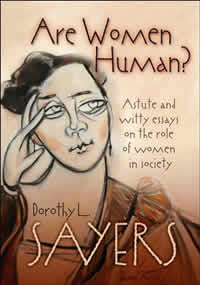Book Notes
 Dorothy Sayers, Are Women Human? (Grand Rapids: Eerdmans, 1971, 2005), 69pp.
Dorothy Sayers, Are Women Human? (Grand Rapids: Eerdmans, 1971, 2005), 69pp.
Are women human? That's the stark question the British writer Dorothy Sayers (1893–1957) posed in two short essays written in 1938, and originally published in 1947 in a collection of her essays called Unpopular Opinions. She had more than an academic interest in the question. When she finished Somerville College, Oxford, with first class honors in modern languages in 1915, they didn't yet grant degrees to women.
The gist of Sayers' argument is captured in a quote she takes from DH Lawrence: "Man is willing to accept woman as an equal, as a man in skirts, as an angel, a devil, a baby-face, an instrument, a bosom, a womb, a pair of legs, a servant, an encyclopedia, an ideal or an obscenity; the one thing he won't accept her as is a human being, a real human being of the feminine sex." Such was her radically simple argument, that women be acknowledged as human beings, and only subsequently labeled as a subset of human beings qualified by biology, culture, ethnicity, age, economics, nationality, and so on.
Sayers also made an observation about the Gospels. Women, she noted, were "the first at the Cradle and the last at the Cross." The many women who appear in the gospels, says Sayers, "had never known a man like Jesus—there never has been such another. A prophet and teacher who never nagged at them, never flattered or coaxed or patronized; who never made arch jokes about them, never treated them either as 'The women, God help us!' or 'The ladies, God bless them!'; who rebuked without querulousness and praised without condescension; who took their questions and arguments seriously; who never mapped out their sphere for them, never urged them to be feminine or jeered at them for being female; who had no axe to grind and no uneasy male dignity to defend; who took them as he found them and was completely unselfconscious. There is no act, no sermon, no parable in the whole Gospel that borrows its pungency from female perversity; nobody could possibly guess from the words and deeds of Jesus that there was anything 'funny' about women's nature."
You can read this tiny volume in one sitting, and if you do you will be greatly rewarded. My Eerdmans edition has a short introduction by Mary McDermott Shideler.


